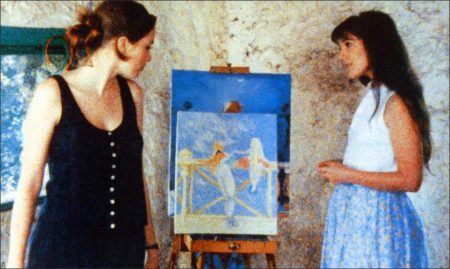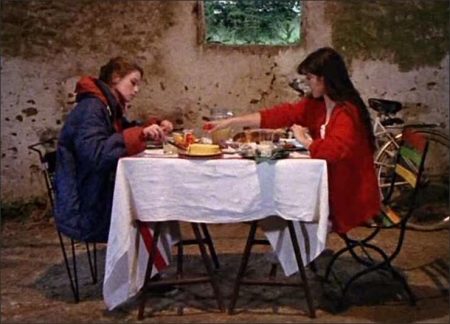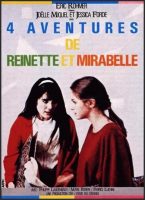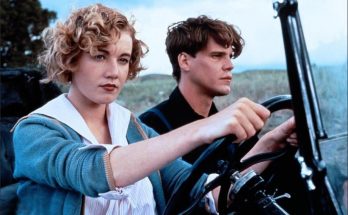Four Adventures of Reinette and Mirabelle movie synopsis. Reinette and Mirabelle are two young girls. Reinette lives in the countryside, Mirabelle in Paris. They meet during a holiday of Mirabelle in the country, when Reinette helps her to repair the tube of her bicycle and shows her the beauties of nature and in particular the ‘blue hour’. They like each other and decide to take a flat together in Paris, where they’ll attend at the University. But isn’t so easy to live together when the characters are so different: as Reinette is simple and enthusiastic, as Mirabelle is obscure and lazy.
Four Adventures of Reinette and Mirabelle (French: Quatre aventures de Reinette et Mirabelle) is a 1987 French film directed by Éric Rohmer, starring Joëlle Miquel, Jessica Forde, Mr. Housseau, Philippe Laudenbach, Mme. Housseau, Jean-Claude Brisseau, Yasmine Haury, Béatrice Romand and Marie Rivière.
The film consists of four episodes in the relationship of two young women: Reinette, a country girl, and Mirabelle, a Parisian. The first episode is entitled The Blue Hour and recounts their meeting. The second centers on a café and a difficult waiter. In the third, the girls discuss their differing views on society’s margins: beggars, thieves and swindlers. In the fourth episode, Reinette and Mirabelle succeed in selling one of Reinette’s paintings to an art dealer while Reinette pretends to be mute and Mirabelle, acting as if she does not know Reinette, does all the talking.
Film Review for Four Adventures of Reinette and Mirabelle
should be some consolation to anyone who’s reached 30, 40, or even 50 without feeling like they’ve accomplished anything of consequence that Eric Rohmer was past 30 when he made his first few shorts (which, in retrospect, were rather like vaguely promising doodles—though one starred a fresh-faced, 20-year-old Jean-Luc Godard), 38 when he finally made a feature (The Sign of the Lion, a very good film, but a false start, career-switch-wise; he was editing Cahiers du Cinéma at the time), and 49 when My Night at Maud’s, the film that announced his arrival as a filmmaker to be reckoned with, premiered at the 1969 Cannes Film Festival.
Even so, critics contemporaneous of Rohmer’s subsequent output often treated his unfolding filmography as if it wasn’t much more than an unending series of sophomore efforts, each failing to live up to My Night at Maud’s and Claire’s Knee’s incomparable one-two punch. By the close of the 1980s, it must have seemed to some that he was willfully making pastel trifles about romance among beachfront properties and picturesque vineyards, a career reduced to one-after-another attempts to recapture Claire’s Knee’s alchemical, lightning-in-a-bottle wonder.
It also doesn’t help that Rohmer’s attitude toward visual style is deceptively simple, bordering at times on indifferent; you would be right in some respects, and wrong in others, to conclude that he was only concerned with “depicting” action and conversation in a visually agnostic manner. It often doesn’t look like he’s doing anything with the camera, but with adequate exposure to his work, even the greenhorn cinephile can spot a “Rohmer shot” from a mile away.
Looking across his whole body of work, it’s clear that it’s as diverse and substantial as anyone’s, from Fassbinder to Ford. His character as an artist, how he controls and generates the specific style and rhythms, how his attitude shapes his work, is more accurately determined by studying the differences between one film and another, rather than reflexively noting their surface similarities and lazily building on the tacit agreement among film critics that Rohmer’s films let you feel smart while taking in the real-estate porn and contemplating the limber specimens of French youth.
Four Adventures of Reinette and Mirabelle appeared at the tail end of Rohmer’s busiest decade. The 1980s also saw the director make three, arguably four game-changing masterpieces (The Aviator’s Wife, The Good Marriage, Full Moon in Paris and, mightiest of them all, Le Rayon Vert); he was also enjoying a phase of freewheeling experimentation, a fluid rearrangement of tones, attitudes, and concerns that would ultimately lead to his triumphant “Tales of the Four Seasons” series in the 1990s, and to tackle digital, delve further into period stories, and face his most pessimistic and romantic extremes, in his final decade.
Four Adventures uses a country-mouse-and-city-mouse template to explore morality, aesthetic sense, urban and rural savvy, and a host of other concerns. Reinette (Joëlle Miquel) meets Mirabelle (Jessica Forde) when the latter’s bicycle catches a flat on the country road near Reinette’s home. It’s hard not to connect the first episode with Le Rayon Vert: In both, a pair of characters makes a special effort to witness an unusual natural phenomenon (the green flash of sunset, there; the “blue hour,” i.e. the silent, pre-dawn moment between night birds signing off and day birds waking up, here), and in his unique, low-key fashion, Rohmer creates evocative, Murnau-esque lighting effects as the pair waits patiently in the darkened field in their bedclothes.
The shared experience leads to the pair moving into Mirabelle’s Paris flat. The other three adventures see Reinette getting accustomed to rough-and-tumble city life and trying to reconcile differing moral codes (hers rigid, Mirabelle’s defiantly wobbly) that threaten to divide the pair. The final chapter is an enormously entertaining and satisfying illustration of how far Reinette and Mirabelle have come to find each other; fast friends trade in a tenuous, circumstantial bond for a real one.
If the film has any weaknesses, it can be said that the sequence involving the misanthropic sidewalk cafe waiter plays a little artlessly to a broader comic space than the otherwise subtle, contemplative film can hope to accommodate. It plays like a Chaplin short, perhaps even pretty well, but the mix feels off. The finale is a much more characteristic Rohmer comedy, as it manages to juggle a narrative ellipsis (we sort of know what they plan to do, but we don’t know how it’s going to happen), misunderstanding, misdirection, a touch of theater, takes full advantage of a Rohmer regular (Perceval star Fabrice Luchini, in peak form), and caps it off with a punchline that can go toe-to-toe anytime with Hecht/MacArthur’s “That son of a bitch stole my watch.”
Four Adventures of Reinette and Mirabelle (1987)
Directed by: Eric Rohmer
Starring: Joëlle Miquel, Jessica Forde, Mr. Housseau, Philippe Laudenbach, Mme. Housseau, Jean-Claude Brisseau, Yasmine Haury, Béatrice Romand, Marie Rivière
Screenplay by: Eric Rohmer
Cinematography by: Sophie Maintigneux
Film Editing by: María Luisa García
Art Direction by: Joëlle Miquel
Music by: Ronan Girre
Distributed by: Les Films du Losange
Release Date: February 4, 1987
Visits: 111





